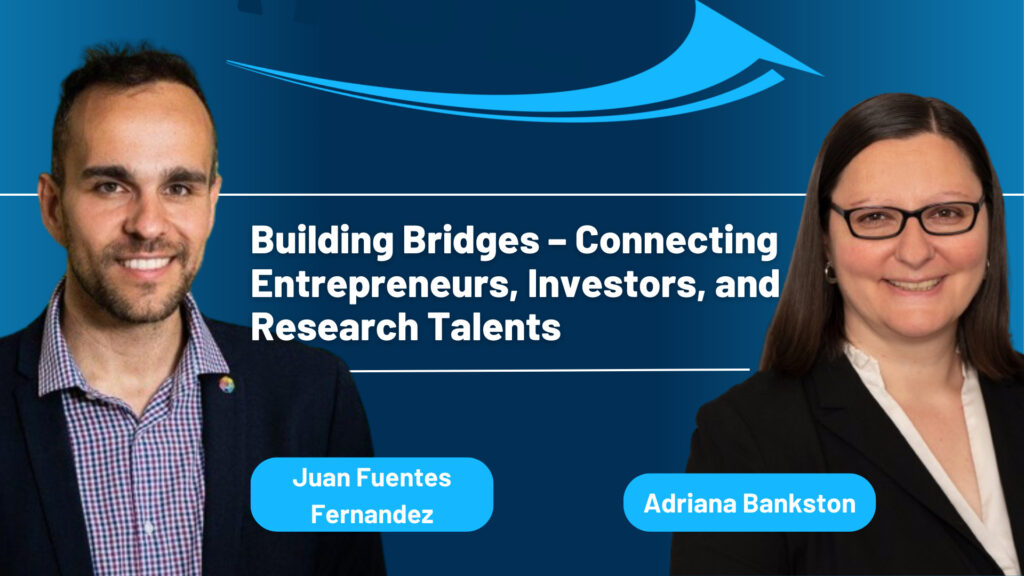
Building Bridges – Connecting Entrepreneurs, Investors, and Research Talents
Building Bridges – Connecting Entrepreneurs, Investors, and Research Talents https://theraise.eu/wp-content/uploads/2023/11/The-Researchers-Impact-on-Startup-Innovation-1024x576.jpg 1024 576 RAISE fosters startup growth and scale-up within and across Europe RAISE fosters startup growth and scale-up within and across Europe https://theraise.eu/wp-content/uploads/2023/11/The-Researchers-Impact-on-Startup-Innovation-1024x576.jpgIn November 2023, the event “Leveraging Research(ers) for Startup Success” unfolded as a beacon of insights, exploring the profound impact of researchers on startup innovation and the broader entrepreneurial landscape. This series of sessions, organised by the RAISE team and spearheaded by the International Consortium of Research Staff Associations (ICoRSA), was crafted to illuminate the indispensable role played by researchers in propelling real-world impact, fostering innovation, and nurturing talent within the dynamic startup ecosystem
At the heart of this series was Session 2: Building Bridges: Connecting Entrepreneurs, Investors, and Research Talents. This session, held on November 6, 2023, set out to explore crucial aspects of linking entrepreneurs with research talent, a nexus that fuels innovation and drives startup success. The agenda featured a rich tapestry of topics:
- Navigating the Intersection: Unveiling the Role of Research Talent in Startup Success.
- The Dynamics of Entrepreneur-Researcher Collaboration: Examining the Synergy.
- Fostering Talent: Strategies for Nurturing Research Talent Development.
- Policy Entrepreneurship: Shaping Research, Innovation, and Startups.
- Connecting Startups with Investors: Exploring Commercial Development Opportunities.
- How to Connect Entrepreneurs with Research Talent: A Practical Guide.
- Key Elements for Successful Entrepreneur-Researcher Partnerships: Decoding the Formula.
- Role of Networking: Linking Startups with Investors or Commercial Opportunities.
- Best Practices: Bridging the Gap Between Startups and Potential Partners.
The session was graced by mentors provided by the RAISE project, adding an invaluable layer of expertise to the discussions. Adriana Bankston, a science policy and a former bench scientist, shared her insights. Alongside her, Juan Fernandez, an investor and representative for LALIGA in the Nordic Countries, brought his extensive experience to the table. Their guidance provided a compass for startups and researchers navigating the intricate landscape of collaboration and innovation.
1. Empowering the Next Generation: Connecting Entrepreneurs and Research Talents – Adriana Bankston
In a landscape where research seamlessly converges with entrepreneurship, the journey from academic endeavours to startup success is both challenging and transformative. Adriana Bankston, drawing from her academic background, sheds light on four key points that underscore the crucial connection between entrepreneurs and research talents.
Translating Research into Startups: A Journey from Lab to Market
Adriana emphasises the significance of translating research outcomes into tangible startups. Having witnessed students navigate this transformative journey from lab work to entrepreneurship, she highlights the need for a bridge between academic prowess and entrepreneurial acumen. The process involves not only recognising the potential commercial applications of research but also equipping students with the necessary resources and experiences.
The transition from academia to startups involves a paradigm shift. Recognising the gap between lab work and real-world applications, educational resources play a significant role. Exposing students to an entrepreneur curriculum and real-world experiences provides them with insights that go beyond the confines of the laboratory. This early exposure is critical in preparing them for the challenges and opportunities that entrepreneurship presents.
Developing Entrepreneurial Skills: Critical Thinking and Leadership
Beyond the technical expertise gained in a laboratory, this session underscores the importance of cultivating entrepreneurial skills. Critical thinking and leadership, often honed through practical experiences, become indispensable assets for individuals venturing into the entrepreneurial space.
Critical thinking and leadership are very important for succeeding in starting and running a business.. Adriana advocates for the early development of these skills, urging not just students but any trainees interested in startups to embark on a journey of skillset development. The ability to think critically and lead effectively enhances problem-solving capabilities and ensures a resilient approach in the face of challenges.
Encouraging Early Skill Set Development for Entrepreneurs
There is a need to encourage early skill development for individuals interested in startups. Beyond the confines of academic research, instilling entrepreneurial skills, critical thinking, and leadership qualities sets the stage for a more vibrant and innovative startup ecosystem.
Recognising the transformative potential of startups, encouragement to develop entrepreneurial skills starts early. Whether it’s students or other trainees, instilling an entrepreneurial mindset fosters adaptability and resilience. Early skill set development lays the foundation for a generation of entrepreneurs who are not just technically adept but also possess the essential qualities for navigating the complexities of startup environments.
The Role of Universities in Developing Training Programmes
In the pursuit of nurturing the next generation of entrepreneurs, there is a call for a proactive role for universities and the need for universities to develop more training programmes, citing the emergence of state-level programmes and regional forums that facilitate interactions between innovators and investors.
Universities play a significant role in shaping the entrepreneurial landscape. Adriana suggests that the development of more training programmes should be a priority. The existence of state-level programmes and regional forums showcases a growing recognition of the importance of early-stage entrepreneurial education. These initiatives, happening on campuses and even extending to High School accelerators, underscore the commitment needed to instill entrepreneurial skills at the grassroots level.
A cornerstone for driving innovation, propelling startups to success
These insights provide a roadmap for universities, students, and trainees to seamlessly transition from academic pursuits to the startup world. The synergy between research talents and entrepreneurship emerges as a cornerstone for driving innovation, propelling startups to success, and shaping a future generation of impactful entrepreneurs.
2. How can researchers contribute to startup success?
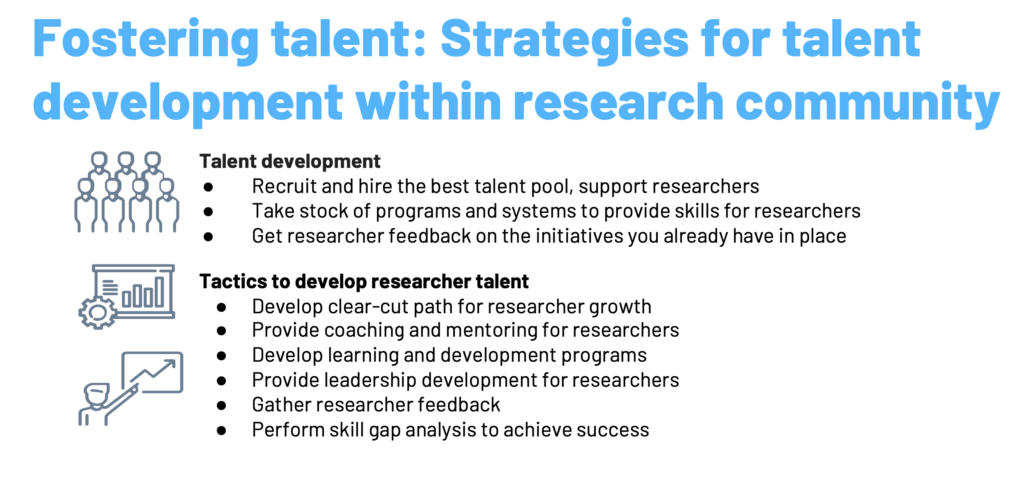
In the quest for startup success, researchers emerge as very significant contributors, offering unique perspectives and skills. Adriana Bankston identifies three key areas where researchers can significantly impact startup growth: Developing Talent, Recruiting, and Retaining. Let’s delve into each of these areas to uncover strategies for leveraging researchers’ potential.
Developing Talent: Fostering the Seeds of Innovation
It is of paramount importance to develop talent for the growth of startups. This echoes the parallel process in science policy, where young, talented individuals play a crucial role in making a real-world impact. The first consideration is understanding the specific talents needed for the startup’s growth and aligning them with the problem-solving goals. A critical aspect is the correlation between talent availability and ecosystem performance, transcending the impact on the startup itself to influence the entire ecosystem.
Recognising the right talent requires a profound understanding of the startup’s objectives. It involves aligning the talents with the unique challenges and problem-solving requirements. A thriving ecosystem attracts diverse talents, creating a symbiotic relationship where the startup benefits and, in turn, contributes to the ecosystem’s vibrancy.
Recruiting Talent: Bridging the Gap between Academia and Real-World Needs
The recruitment of talent becomes a critical juncture where the educational system and universities need to bridge the gap. Educational institutions might fall short in generating talents that meet the dynamic needs of startups. Connecting what is taught in the classroom with real-world applications is essential. Researchers, equipped with valuable knowledge, often struggle to translate and integrate into the entrepreneurial ecosystem. Hence, the challenge lies in selling the ecosystem to researchers, demonstrating the benefits and career advancements associated with plugging into it.
Recruiting talent demands a proactive approach to reshaping educational systems. Integrating real-world applications into academic training is essential. For startups, recognising the demand for talent in the global marketplace is crucial. The challenge, then, is to effectively communicate the opportunities and benefits to researchers, ensuring that they understand the tangible advantages of plugging into the entrepreneurial ecosystem.
Retaining Talent: Navigating Policy Challenges and Practical Experiences
Retaining talent, especially foreign-born researchers, presents unique challenges, primarily in the policy and immigration space. Adriana highlights the policy and advocacy efforts required to create an environment conducive to retaining foreign talent. Beyond policy considerations, the focus shifts to practical experiences, educating researchers in the entrepreneurial process. The aim is to equip them with the skills necessary for entrepreneurial roles, even while still engaged in research.
Retaining talent involves advocating for policies that encourage foreign talent to stay and contribute to U.S. labs and startups. This entails addressing visa and immigration policies hindering the retention of foreign-born researchers. Simultaneously, fostering practical experiences and entrepreneurial education becomes paramount. The shift is from merely acknowledging the entrepreneurial nature of the research process to actively training researchers in entrepreneurial skills, creating a bridge between academia and entrepreneurial roles.
Startups to unlock the full potential of researchers
These insights provide a comprehensive framework for startups to unlock the full potential of researchers. By developing, recruiting, and retaining talent effectively, startups can not only thrive but also contribute to the dynamic ecosystems they inhabit. The emphasis on diversity in the talent pool and the transformative role of researchers in shaping entrepreneurial landscapes serves as a guiding beacon for startups seeking sustainable success.
3. Interdisciplinary Insights and Access to Research: Navigating the Startup-University Nexus
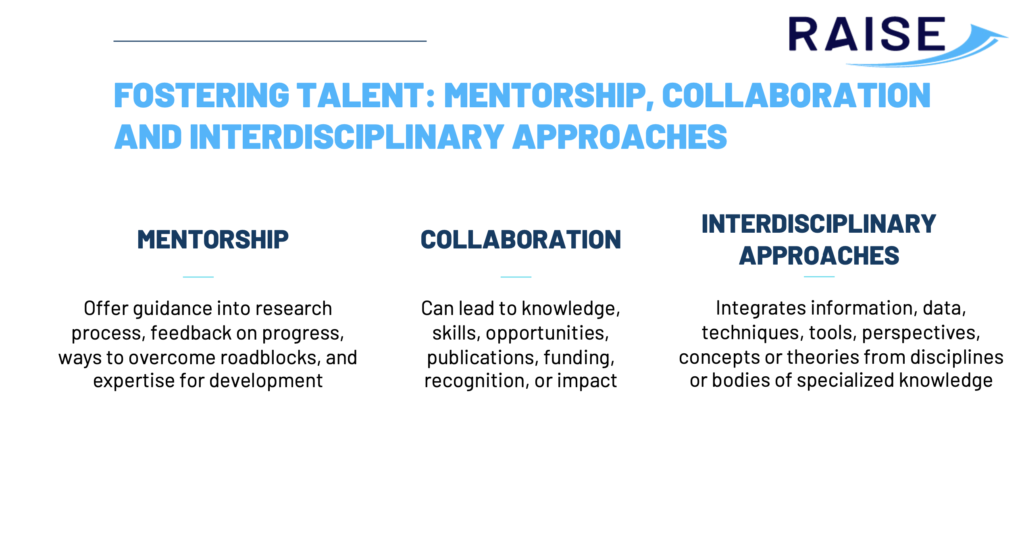
Three key points illuminate the dynamic interplay of interdisciplinary insights and access to research. This symbiotic relationship forms the crux of innovation, shaping the future of both academia and entrepreneurial endeavors.
University as the Nurturing Ground for Startup Ecosystems
Universities stand as the epicenter of the startup ecosystem, acting as vital contributors of talent and knowledge. Adriana highlights the profound connection between universities and startups, with many entrepreneurial ventures sprouting from university projects. Drawing from her experiences at the University of California, she underlines the role of federal funding, particularly in institutions like UCS, in fostering innovations. The excitement stems from the emergence of spin-off companies, often initiated by the creative endeavors of graduate students. Additionally, startups can tap into the support services provided by universities, creating a bridge between academia and practical applications.
The university’s role extends beyond academic pursuits, serving as a nurturing ground for the seeds of entrepreneurship. Federal funding acts as a catalyst, giving rise to innovations that transcend the confines of research labs. The enthusiasm is palpable when these ideas germinate into startup ventures, especially when spearheaded by the vibrant imaginations of young minds. The potential collaboration between startups and universities is leveraging intellectual property and support services, thereby fostering an environment where innovation thrives.
Universities Promoting Startups: A Two-Way Street
The relationship between startups and universities isn’t one-sided. Startups, born from the innovative corridors of universities, have the power to bring these breakthroughs into practical application. Universities, in turn, play an important role in promoting startups, facilitating a dialogue around addressing grand challenges and global questions. The challenge lies in ensuring these startups receive the visibility they deserve, a realm where policy intervention becomes crucial.
The flow of ideas and innovations isn’t confined to the university’s boundaries. Startups emerge as conduits, translating these breakthroughs into tangible solutions for real-world challenges. Adriana points out the need for universities to actively promote startups, acknowledging their potential to address global issues. Policy advocacy becomes a linchpin, bridging the gap between innovation and awareness. The intersection of startups, universities, and policy serves as a powerful triad with the potential to reshape societal landscapes.
4. Enhancing Relationships: A Call for Collaborative Synergies
Working together is crucial for making the connection stronger between startups and universities. RAISE prompts thoughtful considerations about how universities promote startups, how startups benefit from research activities, and how this relationship can be improved. The onus lies not only on universities to push innovations from labs but also on startups to actively participate in leveraging synergies. The roundtable discussion becomes a space to delve into strategies for nurturing this intricate relationship.
The success of the startup-university relationship hinges on collaboration and thoughtful exploration of mutual benefits. Adriana’s questions spark introspection within the entrepreneurial and academic communities. How startups navigate the terrain of research, how universities champion their ventures, and the potential improvements in this relationship form the nucleus of this collaborative endeavor. The roundtable discussion emerges as a forum to unravel the intricacies and co-create a landscape where innovation thrives.
Guiding both startups and universities through interdisciplinary collaboration
These insights serve as a compass, guiding both startups and universities through the uncharted territories of interdisciplinary collaboration and access to research. The future of innovation lies in the seamless integration of these realms, where academia and entrepreneurship converge to shape a landscape of transformative possibilities.
5. Fostering Collaborations for Talent Acquisition
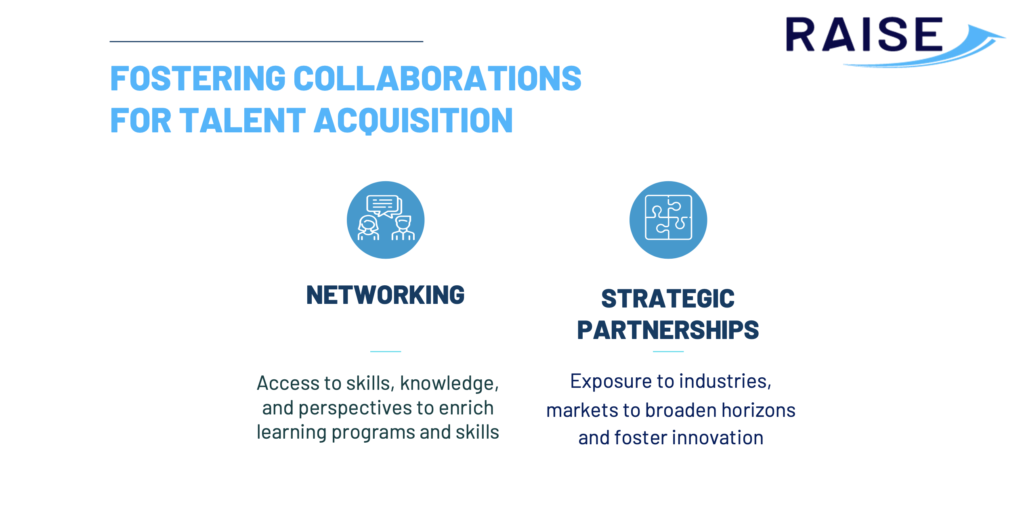
For startups, talent acquisition is not just about hiring individuals; it’s a strategic process involving networking and partnerships. Networking enables startups to tap into a wealth of skills and perspectives, vital for enhancing learning programs. Strategic partnerships, on the other hand, open doors to diverse industries, allowing startups to understand market dynamics and broaden their scope of innovation.
Networking for Skill Enrichment
Networking serves as a catalyst for talent acquisition, offering access to essential skills, knowledge, and diverse perspectives. By fostering networking opportunities, startups can enrich learning programs, addressing the evolving needs of aspiring entrepreneurs.
Strategic Partnerships for Industry Exposure
Strategic partnerships play a crucial role in exposing startups to diverse industries, broadening their horizons. Initiating collaborations through strategic partnerships provides startups with insights into different sectors, fostering innovation and adaptation.
Fostering Talents: Mentorship, Collaboration, and Interdisciplinary Approaches
To foster talents effectively, mentorship plays a significant role, guiding individuals not just within the research process but also in their broader career paths. Collaboration, both within and beyond universities, amplifies the impact of research, ensuring a holistic approach to knowledge and skill development. Embracing interdisciplinary approaches promotes the application of research in wider contexts, influencing societal change positively. Fostering a culture of collaboration is essential to break down silos and enhance the collective impact of research efforts.
Significance of Mentorship
Mentorship is a cornerstone for individuals navigating the research landscape, offering guidance beyond the project at hand. Mentors should not only guide during the research process but also help individuals leverage their talents in the real world post-graduation.
Collaboration Within and Beyond Universities
Collaboration within the university, including multi-PI research projects, enhances knowledge and skill development.
Encouraging collaboration outside university boundaries ensures researchers connect with diverse disciplines, leading to joint funding, recognition, and impactful outcomes.
Embracing Interdisciplinary Approaches
Interdisciplinary approaches encourage researchers to consider broader applications of their work. Collaboration with individuals from different disciplines not only integrates research into wider knowledge but also allows researchers to positively influence society.
6. Startups Connected to Researchers
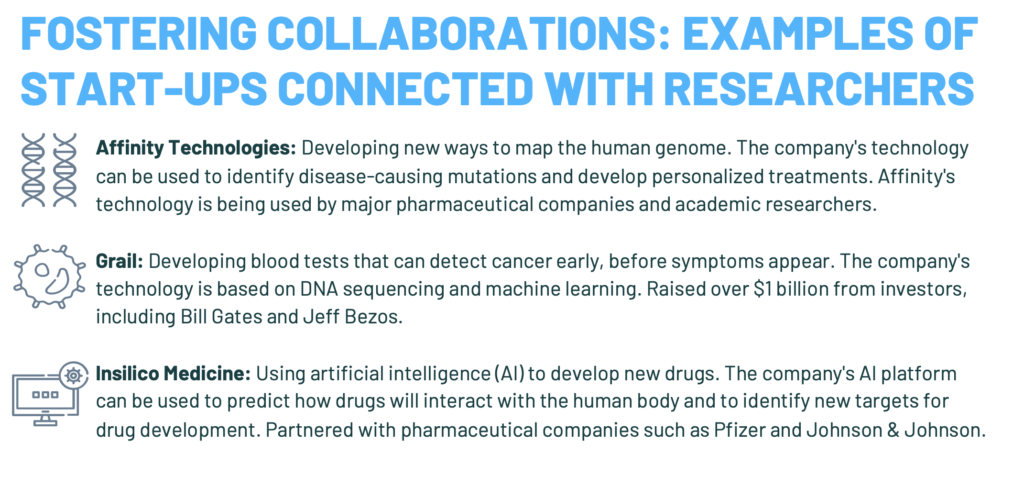
These startups exemplify the dynamic synergy between researchers and entrepreneurs. Whether it’s decoding the human genome, revolutionizing cancer diagnostics, or using AI for drug development, these examples highlight the profound impact that startup ventures can achieve by connecting with researchers. In each case, the intersection of basic science and entrepreneurial innovation has paved the way for transformative solutions with broad societal implications.
1. Affinity Technology: Mapping the Human Genome
Affinity Technology focuses on mapping the human genome, identifying disease-causing mutations, and tailoring personalized treatments.
- Connection to Researchers: Collaborating with academic researchers, the startup delves into the fundamental science of human genome mapping. Its technology is embraced by major pharmaceutical companies, showcasing how basic science questions can lead to groundbreaking solutions.
2. Grail: Revolutionizing Cancer Detection
Grail specializes in developing blood tests for cancer detection, utilizing DNA sequencing and machine learning.
- Connection to Researchers: With strong ties to researchers, Grail’s innovation stems from collaboration in cancer research. The startup’s approach, backed by over one billion in investments from influencers like Bill Gates and Jeff Bezos, exemplifies how niche research can have far-reaching implications for society.
3. In Silico Medicine: AI for Drug Development
Mission: In Silico Medicine employs AI to advance drug development, predicting how drugs interact with the human body and identifying targets for innovation.
- Connection to Researchers: Partnering with major pharmaceutical companies like Pfizer and J&J, In Silico Medicine’s platform emerges from interdisciplinary collaboration. This startup illustrates that questions rooted in AI and drug development, once considered niche, can profoundly impact society when researchers and industry collaborate.
6. What are the strategies for talent development within the research community?
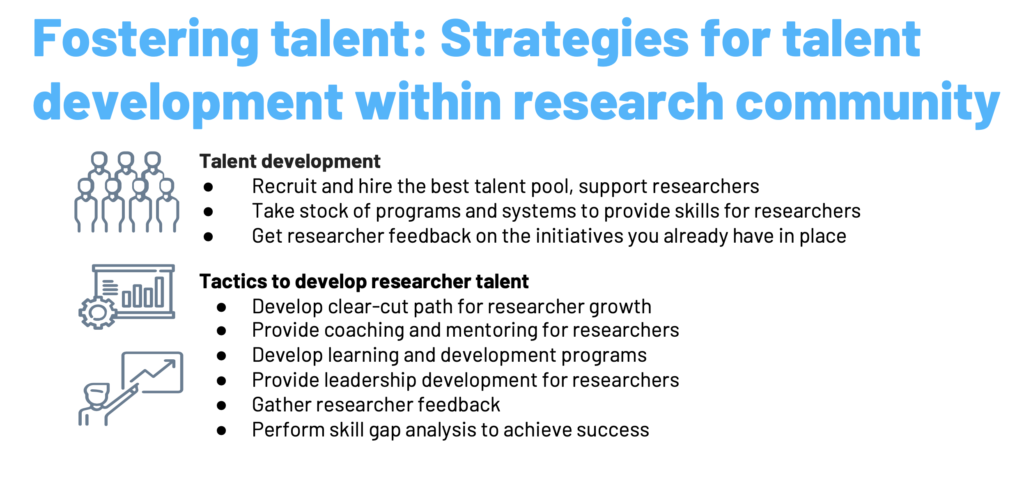
Nurturing talent within the research community involves a multifaceted approach, from recruitment to continuous development. By aligning goals, providing targeted skill development, and incorporating feedback loops, organisations and mentors can create an environment conducive to the growth and success of researchers in their careers.
1. Recruit the Best Pool: Identifying and hiring the most promising talents within the research community is crucial. This involves defining what “the best” means for your specific goals and the qualities you seek in potential team members.
2. Skill Transition Programmes: Facilitate programmes and systems that equip researchers with skills essential for transitioning into new roles. This is especially vital for mentors and collaborators to consider, ensuring a smooth transition for researchers post-graduation.
3. Solicit Feedback from Researchers: Regularly seek feedback from researchers about existing initiatives. Understanding their perspectives and insights can shed light on areas for improvement and help tailor talent development strategies more effectively.
4. Clearcut Path Development: Collaborate with researchers to establish a clear path for career development. This involves outlining achievable milestones, setting expectations, and providing guidance on navigating career trajectories within and beyond academia.
5. Coaching and Mentoring Programmes: Implement coaching and mentoring programmes to offer guidance and support throughout the researchers’ career journeys. These initiatives aim to foster a supportive environment and help individuals navigate challenges.
6. Leadership Development Opportunities: Introduce leadership development programmes tailored to researchers. While often overlooked, cultivating leadership skills is essential for researchers to take on influential roles within and outside academia.
7. Feedback Mechanisms: Establish channels for ongoing feedback, ensuring that researchers can express their thoughts on existing programs and suggest improvements. This two-way communication fosters a culture of continuous improvement.
8. Skills Gap Analysis: Conduct a skills gap analysis to pinpoint the disparity between current skills and desired outcomes. This strategic evaluation informs the development of targeted training programmes and mentoring initiatives.
9. Experiential Learning Opportunities: Integrate experiential learning opportunities into talent development programmes. This hands-on approach enhances researchers’ practical skills, making them better equipped to succeed in their research projects and future endeavours.
7. The Role of Policy Entrepreneurship in Research and Innovation
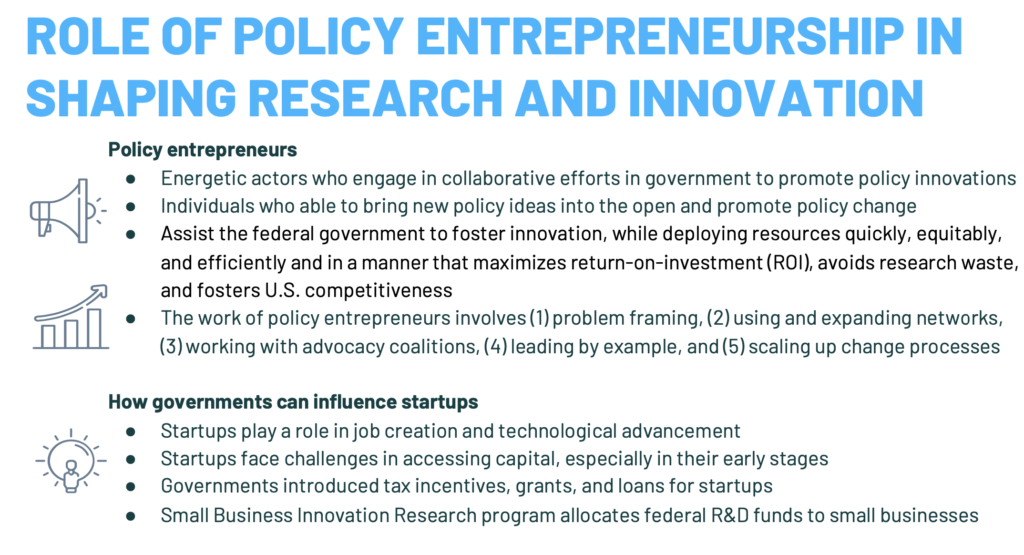
Policy entrepreneurship involves dynamic individuals actively collaborating within government structures to drive policy innovations. While similar to traditional entrepreneurship, this field specifically focuses on shaping government policies to foster positive changes in various domains, including research and innovation.
While policy entrepreneurship often involves influencing government policies to benefit research and innovation, it’s essential to recognise that governments, in turn, can influence startups and universities. Initiatives aimed at improving the startup ecosystem highlight a reciprocal relationship between policy changes and entrepreneurial success.
Policy entrepreneurship is a dynamic force that can reshape the landscape of research, innovation, and startups. By framing challenges, fostering advocacy, leading by example, and efficiently utilising resources, policy entrepreneurs play a significant role in creating positive societal changes and fostering a culture of innovation.
Key Components of Policy Entrepreneurship
1. Framing a Problem: Entrepreneurs identify and articulate societal challenges that align with their expertise. In the context of research and innovation, this could involve recognising issues in existing policies or proposing novel solutions to address emerging problems.
2. Network Utilisation and Advocacy: Leveraging networks, entrepreneurs collaborate with advocacy coalitions to gain support for their policy ideas. This collaborative effort helps create a collective voice for change and facilitates the implementation of innovative policies.
3. Leading by Example: Successful policy entrepreneurs lead by example, embodying the qualities necessary for driving change. Their actions and initiatives demonstrate the feasibility and impact of proposed policy innovations.
4. Efficient Resource Deployment: Recognising limited resources, entrepreneurs deploy available resources efficiently. In the realm of research and innovation, this could involve optimising funding allocation, avoiding research waste, and maximising the return on investment (ROI).
5. Scaling Up for Societal Impact: Once a viable solution is identified, policy entrepreneurs focus on scaling up their initiatives to achieve a broader societal impact. This involves expanding the reach and influence of innovative policies beyond initial implementations.
Applications in Fostering Innovation
Federal Assistance for Innovation: FAS (Federation of American Scientists) collaborates with the federal government to foster innovation by generating new ideas and creating impactful programs. The aim is to improve science, efficiently use limited resources, and enhance the competitiveness of the United States.
Government Influence on Startups and Universities
Startup Support Policies: Governments recognise the importance of startups for job creation and technological advancement. Policy changes, including tax incentives, grants, and loans, aim to ease the challenges faced by startups, particularly in accessing capital during early stages.
Small Business Innovation Research (SBIR) Programme: The SBIR program allocates federal funds specifically to small businesses, emphasizing the government’s commitment to supporting innovation within these enterprises.
Federation of American Scientists (FAS): Policy Entrepreneurship, Turning Ideas into Action
FAS is a nonprofit organisation based in DC with a rich history rooted in national security questions. Evolving over the years, its mission broadened to embed science, technology, innovation, and expertise into government and public discourse. The overarching goal is to contribute to building a healthy, safe, prosperous, and equitable society.
Day One Project
FAS, through its Day One Project, exemplifies the transformative power of policy entrepreneurship. By actively engaging with experts and emerging voices, it has become a driving force in shaping policies that contribute to a more innovative, equitable, and prosperous society.
Day One Project: The Day One Project, initiated in 2019, was initially geared towards influencing the election agenda. However, its resilience and adaptability have made it an ongoing avenue for making tangible changes in policies related to science and innovation.
- Democratising Policy Making: The project focuses on transforming policy from a mere noun to an actionable verb. Its core objective is to democratise the policymaking process by actively engaging with both new and expert voices. Through collaboration with early-career scientists and seasoned experts, the project aims to generate actionable policies.
Examples of Policy Impact
GSA Digital Corps Fellowship: Advocated for government investment in training early-career technologists through a digital corps fellowship programme.
- Outcome: The memo led to the creation of the GSA Digital Corps Fellowship, launched in 2021, fostering collaboration between researchers and government officials.
Sustainable Aviation: Addressing the electrification of aviation.
- Outcome: Ideas from the memo were included in the White House fact sheet in September 2021, outlining actions for sustainable aviation.
Broadband for Schools: Urged government action to close the digital divide in schools by increasing funding for the Federal Communications Commission’s E-Rate programme.
- Outcome: The policy proposal resulted in a legislative change, injecting $7 billion into the programme through the American Rescue Plan in 2021.
AI Research Institutes: Proposed investments in AI research.
- Outcome: The National Science Foundation announced the establishment of 11 National AI Research Institutes, with a $220 million investment in 2021.
The Impact of Memos: The Day One Project’s database showcases over 300 memos, some of which have directly influenced legislative or executive branch actions. The project acts as a catalyst for translating ideas into tangible policy changes.
Exploring Ideas on Day One Project: Those interested can explore the Day One Project website, which serves as a fascinating database of ideas and policy proposals. The diverse range of topics covered in the memos may spark new ideas and perspectives.
Success in Startups: The Power of Thought Leadership and Content Marketing
Juan, a seasoned professional in the startup ecosystem, recently shared valuable insights during a session on leveraging thought leadership and content marketing for startup success. Let’s break down the key takeaways from his engaging talk.
Startup Challenges: Juan discusses the difficulties startups face in getting the resources they need to grow, such as money and support. They point out the struggle of finding these resources and how it can be a big hurdle for startups.
Thought Leadership Strategies: Juan suggests that startups can overcome these challenges by using something called “thought leadership strategies.” These strategies involve showing that the startup is an expert in its field and can lead others. This, according to Juan, is a way for startups to grow not just locally but internationally.
Examples of Success: To illustrate their point, Juan shares examples from their own investments. They talk about how helping startups build a strong personal and professional brand has been beneficial. This branding, they explain, plays a significant role in the success of startups, both in terms of their business and their personal achievements.
80% of the results come from just 20% of the efforts

In the startup world, there’s a wise saying from an Italian philosopher named Pareto, who came up with the Pareto Principle. It says that 80% of the results come from just 20% of the efforts. This idea is crucial, especially for startups in their early stages when there’s not much money, people, or time:
Limited Resources: At the beginning of a startup’s life, there’s not a lot of money, people, or budget. Juan emphasized the need to focus on what really matters.
1. Target the Vital 20%: To make the most impact with limited resources, Juan suggests concentrating efforts on the 20% of things that bring 80% of the results. This means prioritising tasks and events that truly make a difference for the startup.
2. Overcoming Obstacles: mMany startups often face challenges like lack of time or pressure. To address this, they encourage startups to leverage technology for developing commercial and fundraising strategies without spending money or leaving their homes.
3. Strategic Use of Technology: Startups are advised to use technology cleverly to create effective strategies. This could involve using online platforms and tools to reach a broader audience, plan events, and raise funds without incurring additional costs.
Startups can optimise their efforts and achieve more significant outcomes
Juan’s advice centers on the importance of being smart and selective when resources are scarce. By applying the Pareto Principle, startups can optimize their efforts and achieve more significant outcomes, even with limited resources. The emphasis on technology highlights the potential for startups to develop strategies efficiently, making progress from anywhere, whether it’s a home office or a co-working space.
Power of Thought Leadership in Simple Terms
In the vast world of business, a thoughtful strategy called “thought leadership” is gaining prominence. Let’s break down what Juan is sharing, step by step:
1. The Essence of Thought Leadership: Thought leadership strategy revolves around content marketing. This means creating and sharing valuable content. Recent statistics highlight the significance of content marketing in big companies. For instance, 43% of marketers found customers through LinkedIn.
2. The 80/20 Rule in Content Marketing: In content marketing, there is a rule: focus 80% on creating content and only 20% on selling. It’s like a recipe for success. Juan follows this strategy in their professional life, sharing content 20% of the time and selling 20% of the time.
3. Building Trust through Content: While it may not lead to immediate deals, Juan believes this approach generates trust. Interesting content makes startups and investors see you not just as a seller but as a “thought leader.” Being seen as a thought leader boosts sales and helps in raising funds for startups.
4. Applying Marketing Principles to Yourself: Juan suggests applying marketing principles, like the marketing funnel, to oneself. This means creating awareness about what you do and your industry. By consistently generating content, you become a regular presence in people’s minds, leading to consideration, conversion, and loyalty.
5. Strategic Content Creation: More Than Just Selling
Juan also stressed the significance of content creation beyond self-promotion. Rather than incessantly pushing one’s startup, the strategy involves sharing industry news, market trends, and personal stories. This multifaceted approach aims to humanize founders in the B2B environment and foster genuine connections with the audience.
6. Real-Life Examples: Juan, working for the Spanish football league in Denmark, uses this strategy to impact markets in a B2B environment. They generate awareness not just locally but also in Sweden, Norway, and Finland. On a personal level, their investment strategy reaps benefits. Startups approach them to be an investor just because of their online presence, without the need for physical appearances at events.
7. Becoming an Industry Expert: It’s not just about selling; it’s about communicating news, trends, and valuable content to the ecosystem. Sharing not only industry-related content but also personal stories humanizes oneself, making connections more meaningful. In the ever-evolving world of startups, being recognized as an industry expert can open doors to valuable connections with fellow investors and venture capitalists. This not only benefits the individual but also adds substantial value to the startups associated with them. Juan emphasized the importance of strategically positioning oneself as a sector expert to build a robust ecosystem.
8. Leveraging Technology and Language: Juan uses generative AI to create content efficiently. They stress the importance of communicating in a global language, even if you are local. Speaking in English, in their case, has helped in expanding internationally and connecting with a broader ecosystem.
8.1. Harnessing the Power of AI in Content Creation
Acknowledging the role of technology in modern content creation, Juan advocated for using generative AI to produce engaging content. The emphasis on communicating in a global language, such as English, was highlighted as a strategic move for startups aiming to expand internationally.
8.2 LinkedIn Algorithm Hacks
Navigating the intricacies of the LinkedIn algorithm, Juan shared practical tips for optimal visibility. Natural language, regular posting (three times a week), and timely content related to industry trends were recommended. Juan also cautioned against content saturation and highlighted the importance of post timing during the early hours of the day.
8.3 Building Networks: From Shyness to Strategic Connections
Overcoming shyness in networking was addressed with a compelling argument – if you don’t connect, your competitors will. The strategy involves adding key individuals on LinkedIn, not necessarily for immediate sales but to establish a connection. The session stressed the value of thoroughly understanding potential connections to initiate meaningful conversations.
8.4 Maximising LinkedIn Presence: No More Business Cards
The traditional business card was deemed less trendy, with Juan advocating for directing people to LinkedIn profiles instead. By promoting LinkedIn profiles at events and organizational representations, individuals can gradually expose their connections to expert content.
9. Communication for Founders and Startups: Founders and startups are encouraged to communicate as much as possible. It’s not just about talking about the project; it’s about generating value for others through various types of content.
In a nutshell, Juan’s strategy revolves around creating valuable content, building trust, and positioning oneself as an industry expert. This approach not only benefits their professional role but also amplifies the impact of startups and investments in a dynamic and ever-evolving business landscape.
Guide for Startups: Applying the Marketing Funnel for Success
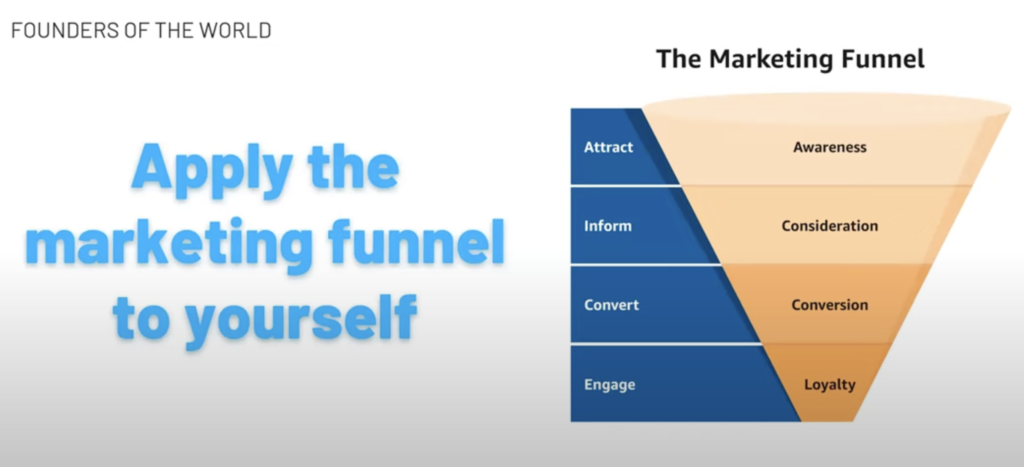
Embarking on the journey of startup success requires a strategic approach. One powerful strategy, as highlighted by the speaker, is applying the marketing funnel. Here’s a comprehensive guide for startups:
1. Awareness
Founder’s Persona: As a founder, envision yourself as a brand. Generate awareness about your industry and startup by consistently engaging with your audience.
Content is Key: Develop a content strategy that aligns with your industry. Regularly share valuable content through various channels to create a continuous presence.
2. Consideration
Building Connections: Actively engage with your audience. Respond to comments, messages, and connect with professionals in your industry.
Networking: Attend relevant events, both physically and virtually. Networking is essential to fostering consideration among potential clients, partners, and investors.
3. Conversion
Building Trust: Through your content and interactions, focus on building trust. Share success stories, testimonials, and case studies that showcase your startup’s credibility.
Personal Branding: Elevate your personal brand by sharing your journey, experiences, and industry insights. This personal touch can significantly impact the conversion process.
4. Loyalty
Consistency is Key: Continue your content strategy even after initial conversions. Stay consistent in sharing updates, industry news, and maintaining an active presence.
Value-Driven Approach: Provide ongoing value to your audience. This can include exclusive insights, offers, or access to resources that keep your audience engaged and loyal.
5. LinkedIn Strategies
Optimizing Your Profile: Ensure your LinkedIn profile reflects your startup’s vision and your personal journey. Use a professional yet approachable tone.
Content Sharing: Leverage LinkedIn’s algorithm by sharing content regularly. Follow the recommended frequency and timing for optimal visibility.
Strategic Networking: Connect with professionals, investors, and potential clients. Use LinkedIn to enhance your networking efforts, building a valuable ecosystem around your startup.
6. International Expansion
Remote Work Dynamics: Exploit new co-working dynamics. Work remotely to explore and enter new markets. Attend events virtually or physically to establish your startup internationally.
Global Communication: If thinking long term, communicate in English, even if your startup is local. Utilize technology and language to break into global markets effectively.
7. Research and Connection
Personalized Outreach: Before reaching out to key individuals, conduct thorough research. Identify commonalities or shared interests to establish a personalized connection.
Relationship Building: Initiate conversations without an immediate sales pitch. Building relationships takes time, and a genuine connection can lead to fruitful partnerships.
8. Institutional Resources
Leverage Institutional Support: Explore resources offered by institutions relevant to your industry and international expansion. These resources can provide market insights, contacts, and support for your startup’s growth.
9. Success Stories
Learn from Examples: Study successful startups that have effectively applied the marketing funnel. Understand their content strategies, international approaches, and networking techniques.
Applying the marketing funnel is not a one-time effort; it’s a continuous, strategic process. By focusing on awareness, consideration, conversion, and loyalty, startups can create a robust foundation for success. Personal branding, content consistency, and thoughtful networking play pivotal roles in building a startup’s credibility and international presence.
The Q&A discussion and key recommendations
Investment Thesis: The mentors and participants emphasized the importance of aligning with the investor’s thesis. Startups should carefully study and understand the preferences and focus areas of potential investors to increase the likelihood of securing funding.
Digital Presence and Branding: Startups should actively manage their digital presence, particularly on platforms like LinkedIn. A strong online presence, including regular updates and achievements, enhances credibility and builds trust with potential investors.
People Over Ideas: The mentors and participants emphasize that many investors prioritize the team and the individuals behind the startup over the idea itself. Investors often look for skills, potential, and the right attitude in founders. The ability to sell oneself through online platforms can be a competitive advantage.
Globalization and Talent: The rapid expansion of technology and globalization have made it easier for startups to access talent from different countries. Platforms for freelancers and professionals allow startups to build diverse and specialized teams, making idea implementation more feasible.
Integration and Trust Building in Europe: The European market is considered more risk-averse due to fragmentation in economies, laws, and languages. The speaker advocates for more integration among European startup ecosystems, fostering trust and collaboration. Initiatives like investment networks and partnerships can contribute to building this trust.
Government Support and Legislation: There is an increasing awareness of the role of governments in supporting startups, with discussions on improving tax structures and legislation to encourage entrepreneurship. Startups should be aware of regional disparities in available resources and opportunities.
Diversity and Inclusion: The conversation touches on the importance of diversity in the startup ecosystem. Initiatives and discussions surrounding diversity are gaining prominence, emphasizing the need for inclusivity in entrepreneurship.
The discussion highlighted key differences in the cultural approach to entrepreneurship between Europe and North America, particularly in terms of risk-taking and support systems. In Europe, there seems to be a more cautious approach, with a preference for gaining experience in established companies before venturing into startups. In contrast, the U.S. fosters a more entrepreneurial mindset from the early stages.
Larisa, a founder based in Germany, emphasized the importance of belief in one’s idea and a relentless commitment to making it work. Her successful startup journey involved leveraging her professional experience, combining technology with commercial insights, and maintaining a strong belief in sustainability.
The conversation also touched upon the challenges faced by angel investors in Europe, with a need for greater awareness and education about the benefits and risks of angel investments. There was a call for collaboration between startup founders, universities, and investors to foster a more open innovation ecosystem.
In terms of connecting with universities for knowledge transfer, it was suggested to take a proactive approach by reaching out to tech transfer offices, connecting with teachers, and involving students in real cases. The importance of universities adapting their educational programs to be more practical, case-oriented, and collaborative with industry stakeholders was also emphasized.
Recommendations
- Encourage a more entrepreneurial mindset in European cultures.
- Promote awareness and education about angel investments.
- Foster collaboration between startups, universities, and investors.
- Proactively connect with universities for knowledge transfer.
- Advocate for more practical and industry-oriented educational programs at universities.
- Participants were encouraged to join the Open Startup Forum LinkedIn group for further networking and discussions.
About the Speakers and Mentors
Adriana Bankston
Adriana Bankston is a former bench scientist turned science policy expert, with a wealth of experience in research and academic policy changes within university settings. Her career was dedicated to showcasing research discoveries on a broader scale. Notably, Adriana also led a non-profit organisation and held various entrepreneurial roles, connecting with professionals worldwide.

Adriana’s role as a senior fellow in science policy with the Federation of American Scientists showcased her expertise in policy entrepreneurship. Her work at this non-profit mirrored the dynamic nature of a startup, making her well-equipped to discuss the convergence of science and policy.
Based in Washington, DC, USA, Adriana was ideally positioned to offer valuable insights into research-powered innovation, real-world impact, and the art of building strategic partnerships and talent scouting. Her diverse background and passion for research made her a dynamic speaker for discussions surrounding innovation, collaboration, and talent development.
To learn more about Adriana:
- Website: adrianabankston.com
- Biography: FAS – Adriana Bankston
Juan Fuentes Fernández
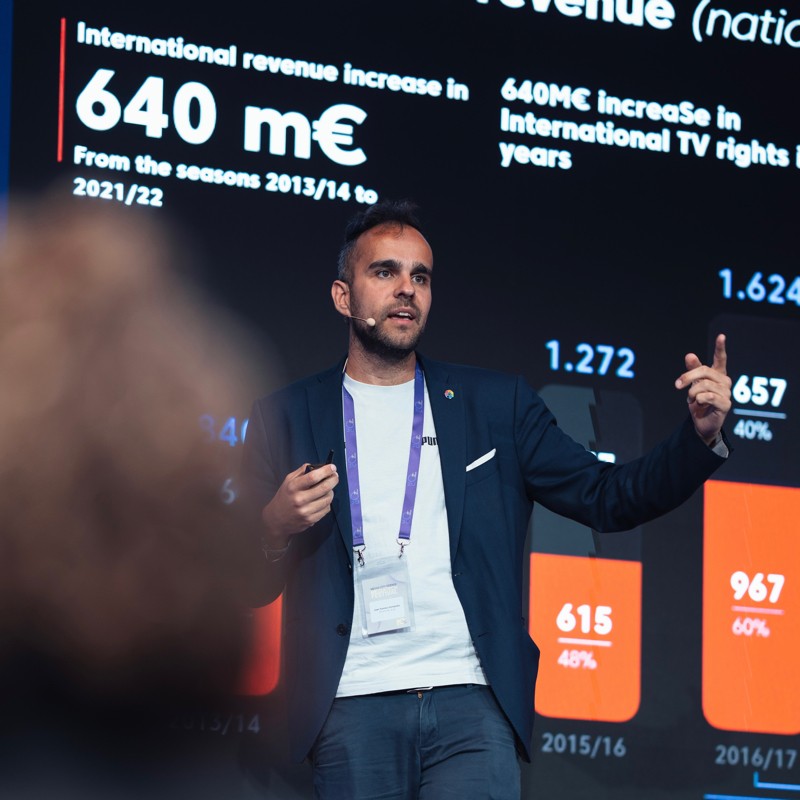
Juan Fuentes Fernández, based in Copenhagen, is a seasoned expert with a career spanning over a decade in various areas, including strategy, international business development, PR & Comms, brand and activation management, project and people management, market research, and CSR.
Having worked across Europe, Africa, the Middle East, Asia, and the Americas, Juan’s global perspective is reflected in his extensive professional journey. His notable achievements include:
Professional Experience
- LALIGA Delegate for the Nordic Countries (2021-Present): Appointed by LALIGA, the Spanish football league, Juan leads the growth strategy in Denmark, Sweden, Norway, and Finland.
- LALIGA Delegate for the Middle East (2017-2021): Spearheaded LALIGA’s successful expansion in Egypt, Sudan, and Libya.
- Editor at Oxford Business Group (Philippines): Analyzed emerging economies in the Asia-Pacific region.
- Trade and Investment Advisor for the Embassy of Spain: Represented Spanish interests in Egypt, Lebanon, Sudan, Ethiopia, and Djibouti.
Academic Involvement: Juan’s academic contributions include research and co-authoring a Working Paper for Harvard Business School on LALIGA’s strategic development. He has served as an instructor and master thesis supervisor in various sports management programs in Spain and Europe.
Angel Investor: As an investor, Juan focuses on sports and entertainment-related startups, emphasizing industry validation and expansion. He avoids investments in projects collaborating with LALIGA or seeking collaboration with his organization.
Multidisciplinary Project Coordination: Juan has successfully managed diverse teams for award-winning projects, such as the Spanish-Arabic football dictionary by the Instituto Cervantes and LALIGA, which received the “Publication of the Year 2021” award in Spain.
Recognition and Social Impact: Juan has been shortlisted as a winner in Spain’s inaugural Nova 111 list, particularly in the telecom, media, and entertainment category. Dedicated to social impact, he has volunteered with various NGOs for over a decade and is a member of Common Goal, donating 1% of his salary to support social causes.
Areas of Expertise: Juan Fuentes Fernández excels in entertainment and sports management, international business development, strategy, market research, PR & Comms, brand and activation management, project and people management, CSR initiatives, academic instruction, keynote speaking, and angel investment. His multilingual and multicultural proficiency further enhances his ability to make a significant impact across various sectors.
- Posted In:
- RAISE News
- Startup News

